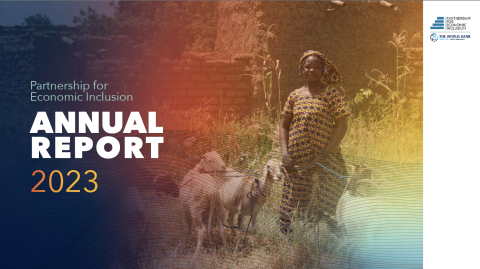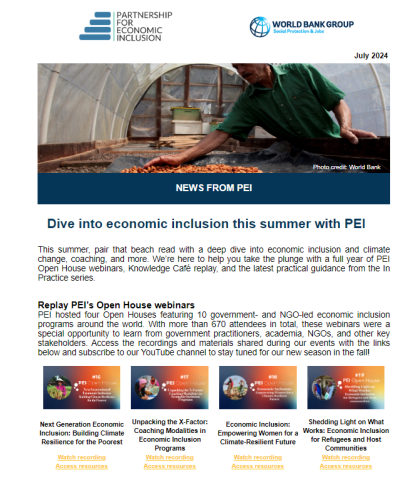PEI Newsletter January 2023
PEI Newsletter May 2023
PEI Newsletter March 2023
PEI Newsletter July 2023
PEI Newsletter September 2023
PEI Newsletter November 2023
PEI Newsletter January 2024
PEI Newsletter March 2024
PEI Newsletter May 2024
PEI Newsletter July 2024
Building Women’s Economic and Social Empowerment
Investing in women is said to be a key to development. In this view, providing education, a cow, or the ingredients for a business will result in great things: increases in income, empowerment, social inclusion, and improved mental health. In this study, IPA researchers studied whether the most vulnerable women could start and sustain small businesses. They evaluated a program by AVSI Uganda, the Women’s INcome Generating Support (WINGS) program. WINGS offered extremely poor people basic business skills training, ongoing mentorship, and cash grants with a purchasing power of $375.
Adapting the Graduation Approach for Refugees in Ecuador
In 2013, amidst a sharp increase in the number of forced displacements and protracted refugee situations, UNHCR, the UN Refugee Agency, started working with Trickle Up to implement the Graduation Approach (GA) with refugees living in extreme poverty. Together, they started pilot programs in Burkina Faso, Costa Rica, Ecuador, Egypt, and Zambia.
Lessons from Trickle Up & UNHCR: Applying a Refugee Lens to Graduation
According to UNHCR, the UN Refugee Agency, both the number of people affected by forced displacement and its duration have consistently increased since 2011. At the same time, the funding gap for humanitarian assistance required by populations experiencing protracted displacement is widening. To address this growing need, the international community is increasingly advocating for, and engaging in, building the self-reliance of displaced populations as a sustainable solution to long-term humanitarian crises.
G2R Activity Update #2. Graduation approach
Graduating to Resilience, a USAID Office of Food for Peace (FFP) funded activity led by AVSI Foundation in partnership with Trickle Up and IMPAQ International, seeks to test the Graduation Approach’s ability to graduate ultra-poor refugee and host community households in Western Uganda from conditions of food insecurity and fragile livelihoods to self-reliance and resilience.
G2R Activity Update #3. Participatory Rural Appraisal
From June-August, 2018, Graduating to Resilience conducted targeting exercises to identify eligible beneficiaries for the Activity. As part of this process, the team conducted two pilots and held After Action Reviews (AARs) daily to address challenges as they occurred. The Activity used a two-part Participatory Rural Appraisal (PRA) approach to identify eligible households, comprised of both Social Mapping and Poverty Wealth Ranking (PWR) exercises.
Refugee livelihoods: new actors, new models
This article explores the potential contributions of governments, development actors, the private sector, and humanitarian actors to support refugee livelihoods. The authors begin by making the case for the early economic inclusion of refugees in order not to prevent or delay the potential contribution of refugees to host economies, noting that this is less easily accomplished in developing countries with high rates of poverty and unemployment.
Economic Inclusion of the Poorest Refugees: Building Resilience Through the Graduation Approach
Humanitarian and development actors are exploring strategies to build resilience and livelihood opportunities for people who are displaced to enable them to better cope with the economic and social stress over the long term. The Graduation Approach—a carefully sequenced, multisector “big push”—can increase refugees’ ability to earn income and increase their self-reliance and resilience
Mid-Term Evaluation of UNHCR Graduation Programme in Egypt
UNHCR established a Graduation Programme pilot in Egypt in 2014, with the overarching objective of supporting refugees in urban areas to sustainably improve their livelihoods and ultimately become self-reliant. The first of their kind, the pilots in both Cairo with Catholic Relief Services (CRS) and Alexandria with Caritas presented an opportunity to adapt a proven methodology to the refugee context in order to better respond to protection needs.

